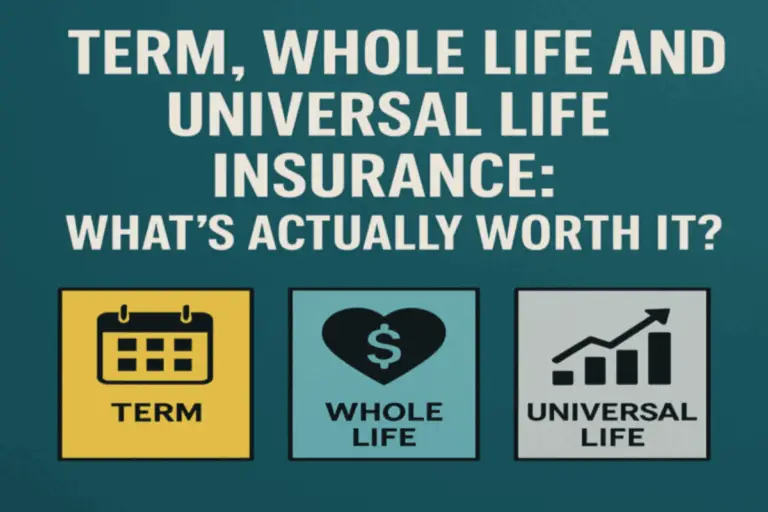Life Insurance, Unpacked: Term, Whole and IUL’s – What’s Actually Worth it.
By Kristin Michelle | KM Insurance Planning

The Insurance Confusion Trap
If you’ve ever tried to figure out which type of life insurance is “best” term, whole life, or universal life, you’re not alone. The internet is full of conflicting advice, outdated strategies, and salesy pitches from agents who may not actually understand the tools they’re selling.
But here’s the truth: when done right, each of these products can serve a powerful purpose. The problem? Most agents are selling and product pushing and not advising. Let’s break down what’s actually worth it, and where the myths and mistakes creep in.
Term Life Insurance: Simple, Affordable, Temporary
Pros:
- Low cost for high coverage
- Great for income replacement during working years
- Simple to understand
Cons:
- Temporary (usually 10–30 years)
- No cash value
- Premiums skyrocket if renewed later
Who it’s best for: Young families, homeowners with a mortgage, business owners needing short-term coverage
Myth Busted: “Term is all you need.” Term insurance is great-until it’s not. If you outlive the policy and still need coverage or liquidity, you’re back to square one.
Whole Life Insurance: Stability with a Price Tag
Pros:
- Guaranteed death benefit
- Cash value grows tax-deferred
- Dividends (in participating policies)
Cons:
- Higher premiums
- Slower cash value accumulation early on
- Not flexible
Who it’s best for: High-income earners, estate planners, those needing guaranteed protection for life. This is also what most senior citizens buy to cover their final expense needs.
Myth Busted: “Whole life is a rip-off.” It can be if it’s misused or oversold. But for someone looking for lifetime guarantees and tax-advantaged savings, it can be a powerful tool.
Indexed Universal Life (IUL): The Most Misunderstood Tool in the Industry
Pros:
- Flexible premiums and death benefit
- Tax-deferred cash value growth tied to market indexes (like the S&P 500)
- Potential for tax-free income in retirement
Cons:
- Requires proper design and ongoing management
- Costs can eat into performance if not monitored
- Highly sensitive to poor advice
Who it’s best for: Savvy planners, business owners, high earners looking for tax-free retirement strategies
Myth Busted: “IULs are scams.” False. Bad agents create bad policies. Poorly structured IULs with max death benefits and minimum funding are why the product gets a bad name. When designed correctly, with proper overfunding and realistic expectations, IULs can outperform many traditional vehicles for long-term, tax-efficient growth.
Warning: Most Agents Don’t Know How to Design IULs Correctly
Many agents push IULs because of the high commissions-not because it’s right for you. If your agent doesn’t talk about max funding, cap rates, policy charges, or long-term sustainability, run.
So, What’s Actually Worth It?
It depends on your goals. Every person’s financial journey is different, and life insurance isn’t one-size-fits-all. What might be essential for one person, like income protection for a young family, might not make sense for someone nearing retirement with no dependents. The key is whether the policy aligns with your long-term plan, your financial values, and the legacy you want to leave behind.
If it fits within your bigger picture, like covering debts, replacing income, building tax-advantaged wealth, or leaving something behind, it’s not just worth it, it’s essential. If it doesn’t, then it might just be another expense without purpose.
- Need affordable, temporary protection? → Term life.
- Want guarantees and legacy planning? → Whole life.
- Looking for tax-free income and flexibility? → IUL-when done right.
The Bottom Line: The Product Type Isn’t the Problem, The Product Choice or Undereducated Advisor is.
Life insurance isn’t one-size-fits-all. The real issue isn’t term vs. whole vs. IUL-it’s who’s designing the strategy. Work with an advisor who can show you numbers, walk you through scenarios, and build a plan based on your goals, not their commission.
Ready to see what’s really worth it for your situation?
Email us Info@KMbenefits.com or Schedule a Meeting
